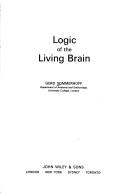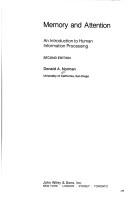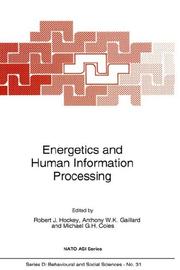Book
Abstract | Keywords | Export | Availability | Bookmark
 Loading...
Loading...Choose an application
- Reference Manager
- EndNote
- RefWorks (Direct export to RefWorks)
Book
ISBN: 1433812746 Year: 2013 Publisher: Washington, District of Columbia : American Psychological Association,
Abstract | Keywords | Export | Availability | Bookmark
 Loading...
Loading...Choose an application
- Reference Manager
- EndNote
- RefWorks (Direct export to RefWorks)
Book
Year: 1961 Publisher: New York : Wiley,
Abstract | Keywords | Export | Availability | Bookmark
 Loading...
Loading...Choose an application
- Reference Manager
- EndNote
- RefWorks (Direct export to RefWorks)
"This book is calculated to be controversial on a number of counts. It advocates a general yet detailed theory of human thought, feeling, and action-probing phenomena from perception to psychodynamics, from sensation to symptoms. It stresses those mental functions occurring between stimulus and response, and pursues them in the laboratory with the aid of techniques like hypnosis, galvanic skin recordings, and introspection. Its approach is cast in the form of a model which is neither neurophysiological nor mathematical but purely conceptual. It appraises some significant problems posed by psychoanalysis, at the same time shaping a different theoretical base. The guiding framework is acknowledged to be unfinished, requiring much additional structure from empirical research. And finally, the experiments suggested by the model often tend to be rather unorthodox in design as well as execution"--
Book
ISBN: 9781433840456 Year: 2023 Publisher: Washington, D.C. : American Psychological Association,
Abstract | Keywords | Export | Availability | Bookmark
 Loading...
Loading...Choose an application
- Reference Manager
- EndNote
- RefWorks (Direct export to RefWorks)
"This textbook presents a comprehensive and accessible overview of the science of attention, conveying central findings and applications to real-world issues, such as its relationship with technology, learning, and memory"--
Book
Year: 2018 Publisher: Basel : MDPI - Multidisciplinary Digital Publishing Institute,
Abstract | Keywords | Export | Availability | Bookmark
 Loading...
Loading...Choose an application
- Reference Manager
- EndNote
- RefWorks (Direct export to RefWorks)
During the 20th century, the world experienced an unprecedented rise in people's cognitive abilities. IQs increased 30 points (with the average IQ remaining 100 only because publishers reset the "average" on their tests). Yet, society's ability to confront serious problems in the world seems as challenged as ever. Problems such as air pollution, global climate change, increasing disparity of incomes, disputes that never seem to move toward resolution (such as between the Israelis and Palestinians), and increasing antibiotic resistance--all of these and many other problems seem to defy us, despite our elevated IQs. Why are there so many serious problems still confronting the world? Why is IQ insufficient for solving serious problems where differences in people's interests are at stake? How can intelligence, broadly defined, help us to create a better world and solve the seemingly intractable problems the world confronts? The essays in this book address these questions and provide some directions for answers.
Book
Year: 1923 Publisher: New York : MacMillan Co.,
Abstract | Keywords | Export | Availability | Bookmark
 Loading...
Loading...Choose an application
- Reference Manager
- EndNote
- RefWorks (Direct export to RefWorks)
'What is the nature of mind?' This question, propounded when man first became conscious of himself, still remains but inadequately answered. Nevertheless, some evident progress has been made. The light of scientific progress is gradually penetrating the various nooks and recesses of our mental life, and the machinery of thought, although dimly revealed, is becoming more apparent in its operation. This monograph is but a mere fragment, explaining little if anything regarding the dynamics of mental process, yet it hopes to place a variety of perplexing problems in a new perspective. We shall have occasion, for example, to examine some current definitions of intelligence, and we shall indicate wherein our research into the value and significance of completion and combination tests forces us to a reconsideration of the criteria of intelligence and to a restatement and a redefining of some fundamental principles.

ISBN: 0471813052 Year: 1974 Publisher: London Wiley
Abstract | Keywords | Export | Availability | Bookmark
 Loading...
Loading...Choose an application
- Reference Manager
- EndNote
- RefWorks (Direct export to RefWorks)
Brain. --- Human information processing. --- Neuropsychology.

ISBN: 0471651370 Year: 1976 Publisher: New York (N.Y.) : Wiley,
Abstract | Keywords | Export | Availability | Bookmark
 Loading...
Loading...Choose an application
- Reference Manager
- EndNote
- RefWorks (Direct export to RefWorks)
Book
Year: 1999 Publisher: Aberdeen Proving Ground, MD : US Army Research Laboratory,
Abstract | Keywords | Export | Availability | Bookmark
 Loading...
Loading...Choose an application
- Reference Manager
- EndNote
- RefWorks (Direct export to RefWorks)

ISBN: 9024733812 9401084793 9400944489 Year: 1986 Volume: vol 31 Publisher: Dordrecht : Nijhoff,
Abstract | Keywords | Export | Availability | Bookmark
 Loading...
Loading...Choose an application
- Reference Manager
- EndNote
- RefWorks (Direct export to RefWorks)
Bioenergetics --- Human information processing --- Congresses. --- Physiological aspects

 Search
Search Feedback
Feedback About UniCat
About UniCat  Help
Help News
News